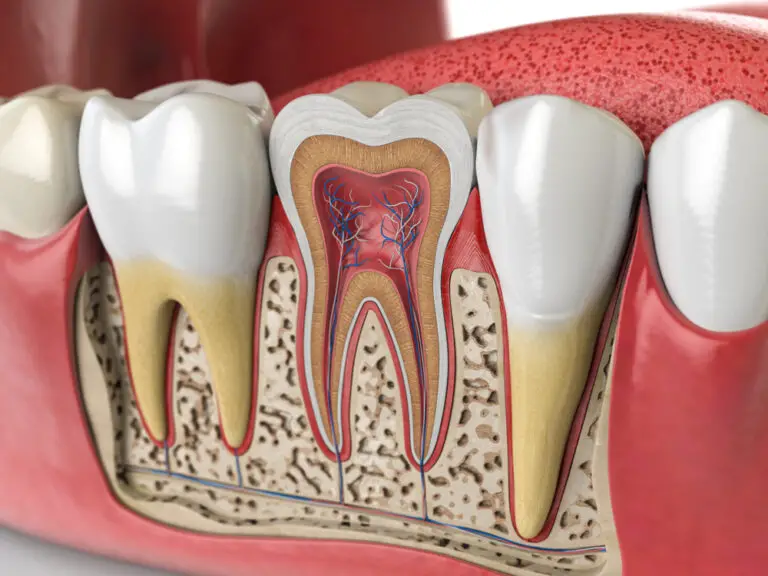Are you experiencing pain or discomfort in the back of your mouth? If so, it could be due to your wisdom teeth coming in. Wisdom teeth are the third molars that typically emerge between the ages of 17 and 25. While some people experience no issues when their wisdom teeth come in, others may experience pain, swelling, and other symptoms.
So, is it normal for wisdom teeth to hurt when they come in? The answer is yes, it is normal to experience some discomfort when your wisdom teeth start to emerge. This is because the process of your wisdom teeth breaking through the gums can cause some irritation and inflammation in the surrounding tissue. However, if the pain is severe or persists for an extended period, it is essential to seek advice from a dentist or oral surgeon to rule out any potential complications.
Understanding Wisdom Teeth

Wisdom teeth are the last set of molars that emerge in your mouth, usually between the ages of 17 and 25. While some people’s wisdom teeth come in without any problems, others may experience discomfort and pain.
Wisdom teeth can cause pain as they emerge due to several reasons. One of the most common reasons is that there is not enough room in your mouth for them to grow properly. This can cause the teeth to push against other teeth, leading to pain and discomfort. Additionally, wisdom teeth can become impacted, which means they are unable to fully emerge from the gum. This can cause pain and swelling in the surrounding area.
It’s important to note that not everyone will experience pain when their wisdom teeth come in. However, if you do experience pain or discomfort, it’s important to speak with your dentist. They can evaluate your individual situation and provide appropriate treatment options.
There are several signs that your wisdom teeth may be coming in, including jaw pain, bleeding or tender gums, difficulty opening your mouth wide, a bad taste in your mouth, and bad breath. If you experience any of these symptoms, it’s important to speak with your dentist.
In summary, while it is normal for wisdom teeth to cause pain as they come in, not everyone will have this experience. If you do experience pain or discomfort, it’s important to speak with your dentist who can evaluate your individual situation and provide appropriate treatment options.
Why Do Wisdom Teeth Hurt?
When wisdom teeth start to come in, they often cause pain and discomfort. Here are some reasons why:
- Eruption: As the tooth pushes through the gum, it can cause pain and tenderness.
- Impaction: If the tooth doesn’t come in straight or gets stuck, it can push against other teeth and cause pain.
- Decay: Wisdom teeth are hard to reach and clean, which can lead to decay and infection.
- Infection: If the tooth is only partially erupted, bacteria can get trapped and cause an infection.
It’s important to see a dentist if you’re experiencing wisdom tooth pain. They can determine the cause and recommend the best course of treatment. In some cases, the wisdom teeth may need to be removed to alleviate the pain and prevent further complications.
In the meantime, there are some home remedies that can help ease the pain. Applying a warm compress to the affected area can help reduce swelling and discomfort. Over-the-counter pain relievers like ibuprofen can also help alleviate pain.
Signs and Symptoms of Wisdom Teeth Pain

When your wisdom teeth start to emerge, you may experience some discomfort or pain. Here are some signs and symptoms of wisdom teeth pain:
- Tender or bleeding gums: As your wisdom teeth push through your gums, you may notice some tenderness or bleeding in the area.
- Jaw pain: Wisdom teeth pain can also cause jaw pain, especially if the teeth are impacted or growing at an angle.
- Swelling around the jaw: If your wisdom teeth are causing pain, you may notice some swelling around your jaw.
- Bad breath: Wisdom teeth pain can also be accompanied by bad breath or an unpleasant taste in your mouth.
- Difficulty opening your mouth: In some cases, wisdom teeth pain can make it difficult to open your mouth fully.
If you are experiencing any of these symptoms, it is important to see your dentist. They can examine your teeth and gums to determine if your wisdom teeth are causing the pain and recommend the appropriate treatment.
It is important to note that not everyone experiences pain or discomfort when their wisdom teeth come in. Some people may not even realize their wisdom teeth are emerging until they have a dental exam. However, if you do experience pain or discomfort, it is important to address it promptly to prevent any further complications.
Stages of Wisdom Teeth Growth
When it comes to wisdom teeth growth, there are a few different stages that you should be aware of. Understanding these stages can help you better understand what to expect and how to take care of your teeth during this time.
Stage 1: Development
The first stage of wisdom teeth growth is development. This is when the teeth are still developing beneath the gums. During this stage, you may not experience any symptoms or pain.
Stage 2: Eruption
The second stage of wisdom teeth growth is eruption. This is when the teeth start to push through the gums and become visible. During this stage, you may experience some pain or discomfort as the teeth push through the gums. You may also notice some swelling or tenderness in the area.
Stage 3: Alignment
The third stage of wisdom teeth growth is alignment. This is when the teeth start to move into their proper position in your mouth. During this stage, you may experience some mild discomfort as the teeth shift around. You may also notice that your bite feels a bit off.
Stage 4: Final Position
The final stage of wisdom teeth growth is when the teeth have reached their final position in your mouth. At this point, any pain or discomfort should subside. However, it’s important to note that not everyone’s wisdom teeth will grow in properly. Some people may experience impacted wisdom teeth, which can cause pain and other dental problems.
Overall, it’s important to keep an eye on your wisdom teeth as they grow in. If you experience any pain or discomfort, be sure to talk to your dentist about your options. They may recommend removing the teeth if they are causing problems.
Complications of Wisdom Teeth Growth

When your wisdom teeth start to grow, it is common to experience some discomfort or pain. However, there are some complications that can arise from wisdom teeth growth that you should be aware of.
Impacted Wisdom Teeth
Sometimes, wisdom teeth do not fully emerge from the gums and become impacted. This can cause pain, swelling, and infection. Impacted wisdom teeth can also damage nearby teeth and cause cysts or tumors to form.
Gum Disease
Wisdom teeth can be difficult to clean, which can lead to the buildup of plaque and bacteria. This can cause gum disease, which can lead to tooth loss and other health problems.
Misalignment
Wisdom teeth can push your other teeth out of alignment, causing bite problems and jaw pain. This can also make it more difficult to clean your teeth, which can lead to other dental problems.
Tooth Decay
Wisdom teeth can be harder to clean than other teeth, which can make them more prone to decay. This can lead to cavities and other dental problems.
If you are experiencing pain or other complications from your wisdom teeth, it is important to see a dentist. They can help you determine the best course of action, which may include extraction of the affected teeth.
Pain Management for Wisdom Teeth
When your wisdom teeth start to come in, it’s common to experience some pain and discomfort. Fortunately, there are several ways to manage the pain and make the process more bearable.
Here are some pain management techniques that you can try:
Over-the-Counter Pain Medications
Over-the-counter pain medications such as ibuprofen (Advil, Motrin) and acetaminophen (Tylenol) can help relieve the pain and swelling associated with wisdom teeth. Be sure to follow the recommended dosage and do not exceed the maximum daily limit.
Ice Packs
Applying ice packs to the affected area can help reduce swelling and numb the pain. Wrap a cold pack or a bag of ice in a towel and apply it to your cheek for 15-20 minutes at a time.
Saltwater Rinse
Rinsing your mouth with warm salt water can help reduce inflammation and promote healing. Mix 1/2 teaspoon of salt in a cup of warm water and swish it around in your mouth for 30 seconds before spitting it out.
Soft Foods
Eating soft foods such as soup, yogurt, and mashed potatoes can help prevent further irritation to your wisdom teeth. Avoid hard or crunchy foods that can aggravate the area.
Good Oral Hygiene
Keeping your mouth clean can help prevent infection and reduce pain. Brush your teeth twice a day and floss daily, being careful not to irritate the area around your wisdom teeth.
In conclusion, managing pain during the emergence of your wisdom teeth can be done with over-the-counter pain medications, ice packs, saltwater rinses, soft foods, and good oral hygiene. If the pain persists or becomes severe, consult your dentist or oral surgeon for further evaluation and treatment.
When to Consult a Dentist

If you are experiencing pain or discomfort while your wisdom teeth are coming in, it is important to know when to consult a dentist. Here are some signs that you should seek professional dental care:
- Severe pain: If the pain is unbearable or lasts for more than a few days, it is time to see a dentist. They can assess the situation and determine if there is an issue that needs to be addressed.
- Swelling: Swelling in the gums or jaw can indicate an infection or other problem. A dentist can examine the area and provide appropriate treatment.
- Difficulty opening your mouth: If you are having trouble opening your mouth, it could be a sign of a more serious problem. A dentist can help alleviate the issue and prevent further complications.
- Bad breath or unpleasant taste in your mouth: These symptoms can indicate an infection or other problem. A dentist can diagnose the issue and provide appropriate treatment.
Even if you are not experiencing any of these symptoms, it is still a good idea to consult a dentist about your wisdom teeth. They can monitor the situation and make recommendations for treatment if necessary. It is generally recommended to have wisdom teeth removed before they cause problems, so consulting with a dentist early on is key.
Preventive Measures
If you have not yet experienced pain or discomfort from your wisdom teeth, there are some preventive measures you can take to avoid future problems. Here are some tips to keep in mind:
- Maintain good oral hygiene: Brush your teeth twice a day and floss at least once a day to keep your teeth and gums healthy. This can help prevent infections and decay that can lead to problems with your wisdom teeth.
- Visit your dentist regularly: Regular dental check-ups can help your dentist monitor the development of your wisdom teeth and detect any potential issues early on.
- Eat a balanced diet: A healthy diet can help keep your teeth and gums strong and healthy. Avoid sugary and acidic foods and drinks that can damage your teeth.
- Avoid smoking and tobacco use: Smoking and using tobacco products can increase your risk of gum disease and other oral health problems.
- Use pain relief techniques: If you are experiencing pain or discomfort from your wisdom teeth, there are some pain relief techniques you can try. Applying a cold compress to the affected area can help reduce swelling and numb the pain. Over-the-counter pain medications can also help relieve pain and discomfort.
By following these preventive measures, you can help reduce your risk of developing problems with your wisdom teeth. However, if you are experiencing pain or discomfort, it is important to see your dentist for an evaluation. Your dentist can help determine the best course of treatment for your individual needs.
Frequently Asked Questions
How can I relieve wisdom tooth pain?
If you are experiencing wisdom tooth pain, there are several ways to relieve the discomfort. You can try over-the-counter pain relievers, such as ibuprofen or acetaminophen. Applying a cold compress to the affected area can also help reduce swelling and pain. Additionally, rinsing with warm salt water can help alleviate discomfort.
What are the symptoms of wisdom tooth pain?
The symptoms of wisdom tooth pain can include tender and swollen gums, difficulty opening your mouth, pain when chewing, and a bad taste in your mouth. You may also notice a small red swelling at your gum line where the tooth is trying to erupt.
When do wisdom teeth typically come in?
Wisdom teeth typically come in between the ages of 17 and 25. However, some people may experience them earlier or later.
How long does it take for wisdom teeth to fully come in?
It can take several months for wisdom teeth to fully come in. During this time, you may experience some discomfort and pain.
What causes wisdom teeth to grow?
Wisdom teeth are the third set of molars that grow in the back of your mouth. They are believed to have been necessary for our ancestors to chew tough, raw foods. However, with modern diets and improved dental hygiene, they are now considered vestigial.
When should I be concerned about wisdom tooth pain?
If you are experiencing severe pain, swelling, or a fever, you should seek medical attention immediately. Additionally, if you notice any signs of infection, such as pus or a bad taste in your mouth, you should see a dentist as soon as possible.







